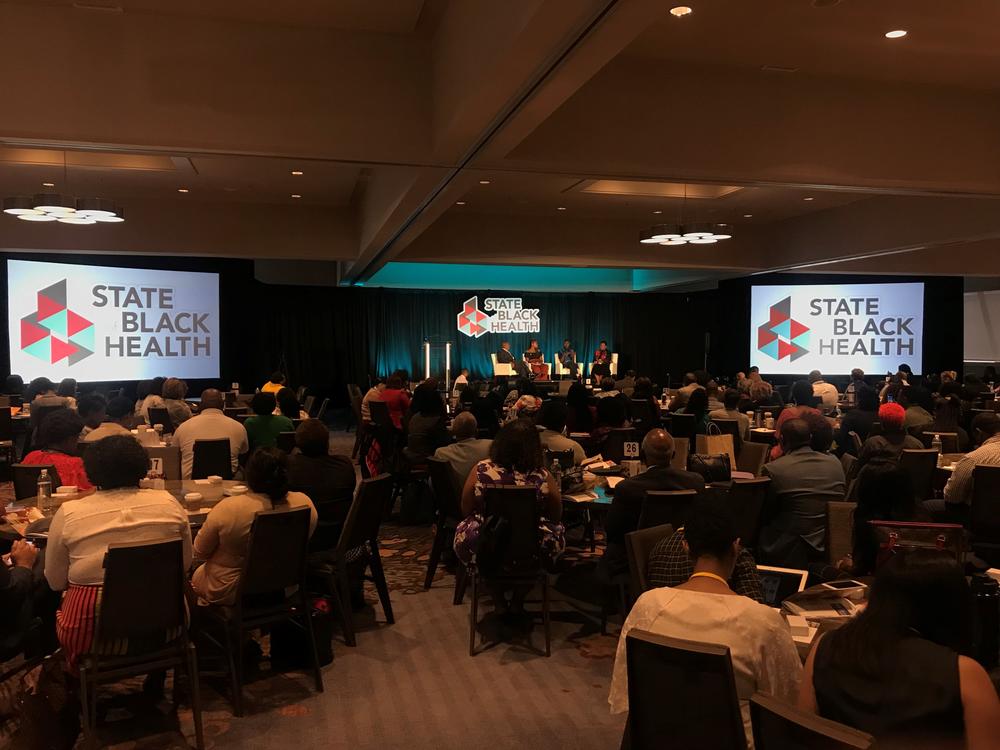Section Branding
Header Content
Tobacco Use And Mental Health Topics Of Discussion At State Of Black Health Conference
Primary Content
Hundreds of African-Americans met in downtown Atlanta Tuesday for the first State of Black Health conference.
On the first day, topics about health in the black community covered more than traditional physical health. Several millennials and younger attendees brought up their concerns with tobacco in their communities.
Kwesi Wilkerson traveled to the conference from Oakland, Calif., and is a part of the African-American Tobacco Control Leadership Council. He identified tobacco as a public health issue but said it’s more than that.
"It's also a social justice issue when you incorporate the ways that black people specifically have been targeted as early as the ‘50s and ‘60s,” Wilkerson said. “This is one of the first ways that black models were given opportunities; being put on billboards and ads for the tobacco company. So, it's like our lack of opportunity was used against us to promote something that was killing us."
Wilkerson said there has also been a lot of misinformation given to African-Americans about the use of electronic cigarettes and consuming tobacco in non-tobacco ways.
Statistics from the Centers for Disease Control and Prevention show that historically, blacks have been exposed to more advertising by tobacco companies than whites. There is also a pattern of more tobacco retailers being in neighborhoods with greater minority populations.
One group of high schoolers from Milwaukee, Wisconsin, were taking a proactive stance against tobacco. They are a part of a group called "Wisconsin Wins." Kayla McPike, a student who attended the conference, said they are taking the fight to tobacco retailers.
"We go out and we try and buy the tobacco products,” she said. “If the retailers sell them to us, then they get fined. So, it's helping them to stop selling to minors and realize it's not okay."
McPike wore a name tag with $691 written on it. She said that’s to represent how much a fine can cost if places get caught selling tobacco to minors.
Though tobacco dominated the early conversation, there was also a focus on mental health. Specifically, how to start that conversation within the black community.
Tina Mensa-Kwao works with the CDC and said it’s about making mental health a “business issue.”
"We see that a lot of other illnesses that affect the black population are more funded,” Mensa-Kwao said. “However, when it comes to mental health, there's a challenge of measuring it, actually seeing it happen and talking about it. We know it's a taboo topic specifically in the African-American population.”
She compared mental health to physical health saying when you don’t feel well you go see a doctor and the same should be done if you don’t feel well mentally.
A study published in the Journal of the American Medical Association shows that suicide rates among black children have increased over the past few years, while the rates among white children have decreased during the same time period.
Though, the top three leading of causes of death in the black community are still heart disease, cancer and stroke.
The conversation at the conference focused on more than just health challenges. Empowering the black community was also a focus, mainly through voting. Many of the panelists and audience members tied together how voting could help with these other issues.
They encouraged voting for candidates who don't take money from the tobacco industry when campaigning. Or showing up to city council meetings to ask and push for programs that may use government funding for mental health.

